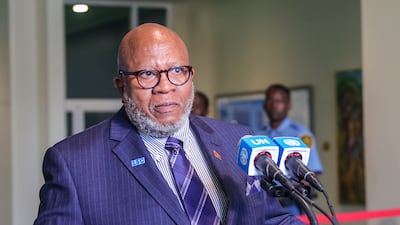Trinidad and Tobago’s ambassador Dennis Francis was elected on Thursday as the next president of the UN General Assembly.
The 193-member world body is a key venue for all countries to tackle urgent issues including growing global poverty, inequality and climate change, and has been at the forefront of the UN's condemnation of Russia’s invasion of Ukraine.
The longest-serving ambassador of the Caribbean nation, Mr Francis will take over the presidency at the start of the 78th session of the assembly in September and will preside over the annual gathering of world leaders later that month.
He was elected by acclamation with a bang of the gavel and loud applause.
Mr Francis will succeed Csaba Korosi of Hungary, a diplomat for nearly 40 years who was highly praised by UN Secretary General Antonio Guterres, who said: “I will miss his advice and guidance.”
The General Assembly, which is the UN’s most representative body, has taken the spotlight in reacting to the war in Ukraine because of Russia’s veto power in the Security Council.
It has adopted six resolutions, which have included demands for Russia to withdraw all its forces from Ukraine and condemnations of its “attempted illegal annexation” of four Ukrainian regions.
Unlike Security Council resolutions, General Assembly resolutions are not legally binding, but they are important as a reflection of world opinion.
When asked how the war would factor into the coming session, Mr Francis said: “I believe that the will exists, and the capacity exists, to think and act globally beyond the limits of the war, and that will be something that I’ll be seeking to encourage in various ways so that we can make common cause in finding consensus, or, if not consensus, at least compromise.”
A career diplomat for nearly 40 years, Mr Francis came out of retirement to become Trinidad and Tobago’s UN ambassador in September 2021.
He previously represented the nation at UN agencies in Geneva, Vienna and Paris and held top posts in the foreign ministry. He also served as high commissioner to Jamaica and was accredited to the Dominican Republic, Haiti and Cuba.
Mr Francis has chosen “Peace, Prosperity, Progress and Sustainability” as his theme, saying they constitute “the four supreme objectives before the international community” at this critical time.
His predecessor Mr Korosi’s theme for the current assembly session has been “Solutions through Solidarity, Sustainability and Science”.
After his election, Mr Francis told the assembly that “education is the great liberator, lifting people up the social ladder and strengthening society in the process”.
A key focus, he said, when world leaders meet in September will be to re-energise action to deliver on UN goals for 2030, which are seriously lagging.
These include ending extreme poverty, ensuring quality secondary education for all children, achieving gender equality, reducing inequality and taking urgent action to combat climate change.
Mr Guterres said Mr Francis would take on the presidency “at a deeply challenging moment for the human family”, pointing to “conflicts and climate chaos, escalating poverty, hunger and inequality, mistrust and division.
The Secretary General added that the 2030 goals were “in danger” and “slipping out of reach”.

